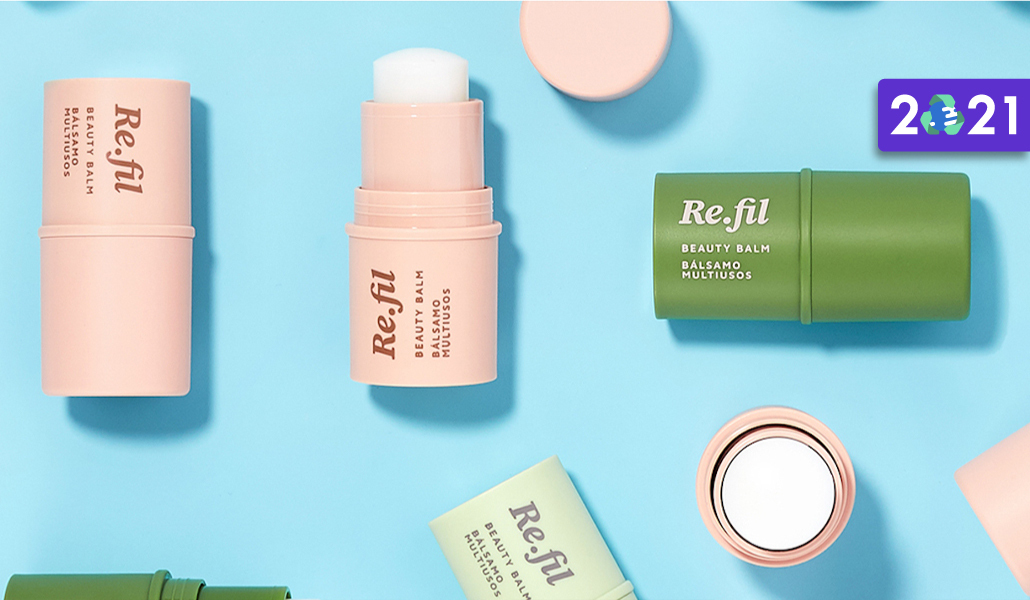This story is part of Glossy’s Earth Week series, which spotlights sustainability efforts and topics across the beauty and fashion industries. You can read some of our other coverage here and here.
On Friday, Birchbox introduced new sustainability goals alongside a new private label brand called Re.fil, which at launch consists of a refillable universal balm for $12 (the refill is $8).
Though the number of sample units produced annually is uncertain, NPD reports that the minis market (defined as deluxe and travel-size samples) grew by 13% in 2018, to a record $1.2 billion in U.S. sales. The proliferation of sample and travel-size products is now a recognizable issue within the sustainable beauty conversation because they are almost always thrown away due to their small sizes. Birchbox pledges that 10% of the products it sells across both its private label brands and brand partners will be refillable or reusable by 2023, through both brand partnerships and a diversified merchandising portfolio. Additionally, Birchbox has a goal of 30% waste reduction by 2025.
When it comes to brand partners, Birchbox — much like Credo and Ulta — is establishing guidelines brands need to adhere to in order to sell or distribute through the retailer. Birchbox plans to have 70% of outer packaging from samples eliminated by the end of 2021. For primary packaging samples, Birchbox is in discussion with brand partners and, over time, will “make recommendations,” said Katia Beauchamp, Birchbox CEO.
“[Being sustainable] is not as simple as saying you’re going to remove something, because you [could still] end up shipping a product using styrofoam packing peanuts,” said Beauchamp. “We have to work with our partners to learn [how they do things], and that will educate us and help us to be more clear and specific.”
Birchbox cut 25% of its global staff in Feb. 2020, affecting U.S., U.K. and Spain employees. In May 2020, Glossy reported that Birchbox saw a 50% lift in month-over-month engagement from subscribers since March 2020, as well as an undisclosed increase in subscriber rates across all of Birchbox’s subscription tiers (three-month, six-month and annual). The retention rate had not changed, said Beauchamp. But even if customers continue to subscribe, there is an undiagnosed epidemic of sample hoarding.
Small pieces of plastic are among the biggest sources of environmental pollution and health disruptors. For example, in Oct. 2020, Australia’s national science agency reported that between 9.25 million and 15.9million tons of microplastics are embedded on the seafloor. And, according to a WWF International study, the average person consumes the equivalent of a credit card’s worth of plastic every week, mostly due to microplastics in tap water and shellfish.
Ad position: web_incontent_pos1
Some brands have already begun to tackle the issue themselves, without the push from subscription boxes or retailers. Glossy reported on Monday that REN and Biossance skin-care brand will present their formal solution to eliminate sachets samples to a coalition of brands in July. Birchbox is in talks with TerraCycle for a recycling program for both sample- and full-size items, but Beauchamp declined to provide a timeline. Birchbox has invested “millions” toward sustainable solutions and partnerships, she said. And it plans to invest “millions more” in the coming years.
“Sachet samples are the dark secret of the beauty industry,” said Arnaud Meysselle, REN CEO. “Two years ago, we moved away from sachet samples and currently use tubes of recycled plastic instead. They cost us 3.5-times more than sachet samples, but we believe it was the right thing to do.”
Meanwhile, BFA Industries, which owns both Ipsy and BoxyCharm, pledged in March to eliminate 100% virgin plastic waste and reverse the effects of plastic pollution across its entire portfolio over the next 10 years. First, it will reduce virgin plastic usage by 50% in all BFA Industries-owned brands by 2024, and it will “begin to influence its brand partners’ material choices,” a press release stated. Refreshments, the BFA Industries private label personal care brand that launched in Nov. 2020, debuted with 30% post-consumer recycled plastic.
“We are in the process of building our sustainable packaging roadmap, with the support of sustainability experts and consultants. It will include new material innovations and guidelines for our brand partners,” a BFA Industries spokesperson said.
FabFitFun also announced modest sustainability changes in the third quarter of 2020. The subscription box added boxes of different sizes to accommodate smaller-sized orders better and, thus, reduce unnecessary packaging. It also switched to a 100% PCR paper box that uses less ink and began using leftover boxes from past seasons to eliminate unused boxes. FabFitFun estimates that its efforts will reduce its long-term greenhouse gas emissions by approximately 44%, not including manufacturing and transportation impacts. FabFitFun has not announced any requirements for its brand partners. However, its box contents most often include full-size items, rather than samples or travel size.
Ad position: web_incontent_pos2
“The whole packaging experience is core to the beauty experience and has been done a certain way for decades,” said Beauchamp. “[Our] thinking is: ‘What can we do to positively contribute toward waste reduction that we directly generate at Birchbox and set examples for the industry that feels attainable?’”




